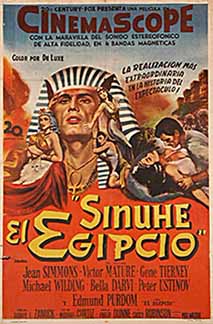
THE EGYPTIAN
US, 1954, 139 minutes, Colour.
Jean Simmons, Victor Mature, Gene Tierney, Michael Wilding, Bella Darvi, Peter Ustinov, Edmund Purdom.
Directed by Michael Curtiz.
The Egyptian is from the world of best-sellerdom. It was based on a very popular novel of the 50s - Sinuhe, The Egyptian. Twentieth Century Fox, with its newly invented Cinemascope, was on the lookout for box-office spectaculars. Edmund Purdom who had been cast instead of Mario Lanza in The Student Prince was given the central role. He appeared in a number of films, but did not have a greatly successful career. The film is lavish in presentation, enjoyable if somewhat superficial. Solid supporting cast like Peter Ustinov and Jean Simmons are quite effective. The film was directed by Michael Curtiz who made a wide variety of film from the 30s to the 60s.
1. How entertaining was this spectacle? What is the main impact of films like this? Why?
2. Why do audiences respond well to costumed soap-operas? The fantasy about other times and other places? The romantic impulse? Spectacle?
3. How interesting are such films with their comparison of ancient society with modern society? Individuals in crisis in other times and in other places? Audience comparisons?
4. How much does the melodrama appeal? The overtones of sexuality and religion? How much in evidence were they here?
5. How intelligent a spectacle was this? Comment on the structure with its flashback. The character of Sinuhe and the moralising on his life?
6. How interesting was the central character of Sinuhe? How was he an Everyman figure? The similarities to the biblical presentation of Moses? The presentation of his birth and the audience response? His identity in the poorer parts of Egypt, his role assisting his father, his dedication to the poor? What kind of person was he as he grew older? His joviality with his friend, Horemheb? The accident of the hunting expedition and the Pharoah? The impact of the risk to his life and his saving his life? His love for Merit? His infatuation with Nefer? The folly of his infatuation with Nefer; his selling all his goods, his betrayal of his dedication, his betrayal of his parents? The impact of their deaths? His hatred for Nefer? And his vengeance on her? The importance of exile on him? His success? How changed was he when he returned to Egypt? His involvement in the plot to assassinate Ahknaton? His being used by Ahknaton's sister? His being used by Horembeb? His decision not to betray Horemheb? The finding of his son? The impact of Merit's death? What had he learnt by his experience of life? How admirable a character, how real, how likeable? Would audiences dislike him?
7. How vivid and real was the picture of Egyptian society? The good aspects of its civilization? Its corruption? Its corruption of men like Sinuhe? The role of religion? The use of slaves? Social chaos, ambition, war?
8. How important was the theme of religion? The establishment of the priests and their attitude towards Pharoah as God? Ahknaton and his changing of such reverence for the Pharoah? His monotheism and worship of the sun? His religious pacifism? The chaos to which his ideals led? His disillusionment by 'reality'? The final political persecution of the sun worshippers? The prevailing of the old order and the old religion with Horemheb? The insights into the relationship between religion and society?
9. How interesting a character was Ahknaton? An idealistic Pharoah? As a failure in governing the land? In plunging the country into unwanted war? The significance of his death?
10. Was there a contrast between his mother and his sister? Their warlike aspects? Ambition and using of people? The betrayal of Baketamon and her having to marry Horemheb? The judgement on these characters?
11. How central a character was Horemheb? His humble origins? His saving the Pharoah? The result of his ambitions and success? His pride? His clash and his betrayal of his earlier ambitions? The fact that he became Pharoah?
12. How did merit present the human aspect of the film? Her relationship with Sinuhe and her devotion to him? Her son? Her religion? Her love? Her death?
13. The role of Captah - his devotion to Sinuhe, the comic aspects of life?
14. The portrayal of Nepher as evil? The way that she wiled the riches out of people? Her betrayal of them? The risk to her life? Her health and the irony of disease ravaging her and her poverty?
15. Was this just a popular melodrama of ancient times or did it have some greater significance?